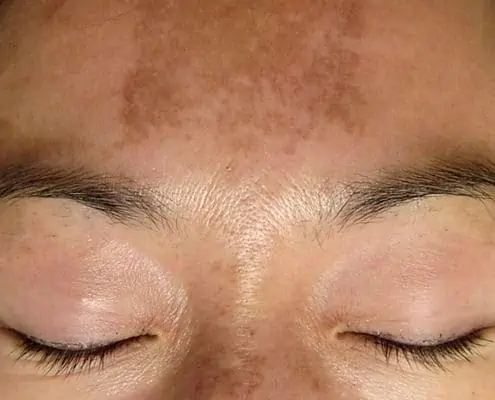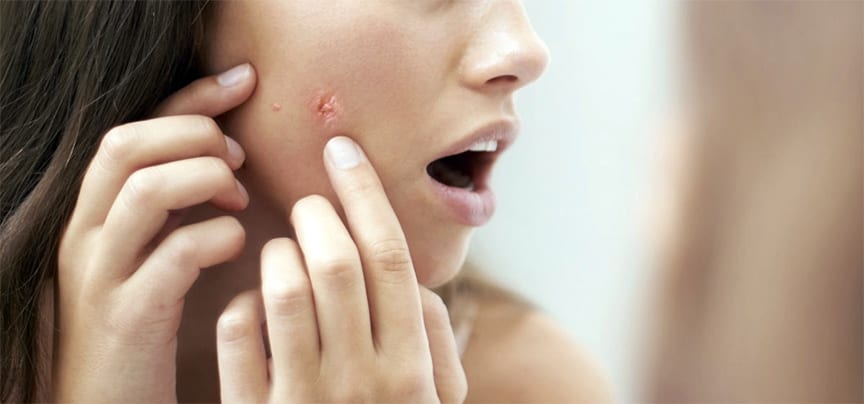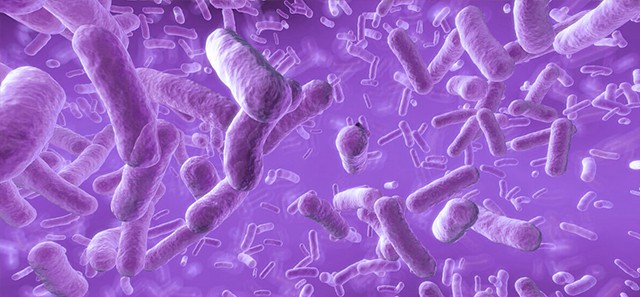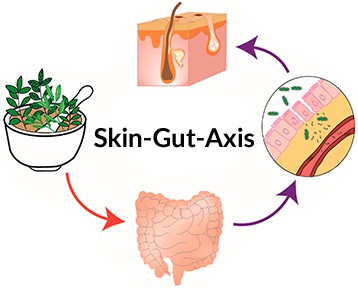
OC 949-428-4500
LA 310-460-2444

Your skin is an organ, just like all your other organs. If you happen to have intolerance to a particular food that causes acne, the chances are good that your other organs don’t like it either… you just can’t see them.
Therefore, determining that you have intolerance to a particular food and properly managing it by eliminating or limiting how much of this food you eat will benefit all your organs, which can have a dramatic positive impact on your overall health and wellbeing.In discovering and managing food intolerance, it is not uncommon for patients to not only clear up their acne, but also find significant relief from other debilitating conditions such as migraine headache, somnolence, and irritable bowel syndrome. For people who suffer from these conditions, this is a big deal!
In a nutshell, for certain people, specific foods can definitely make their acne much worse.Generally speaking for the sake of your skin as well as your overall health, avoid junk foods and any food that contain excess sugar, trans-fats and refined carbohydrates as they are known to be a major cause of acne breakouts.
On the positive side of the food coin, nutritious foods do contain specific minerals, biochemical compounds and nutrients that are essential for healthy, acne free, skin. Accordingly, eating healthy amounts of these foods is a good idea to enhance the health and beauty of your skin.

Silica is a trace mineral that is essential in the process of generating collagen, which is the primary component of the body’s connective tissues – including: muscles, tendons, hair, ligaments, nails, and cartilage – and is vital for healthy skin.
Therefore, a deficiency in silica can cause loss of skin elasticity and slow down wound healing. Silica is best for the prevention of mild to moderate acneZinc is thought to be involved in the control of oil production, and is therefore very important in the control of acne. If fact, some think that acne might be caused in part by a zinc deficiency.
While we are on the subject of Zinc, it is also required for proper immune system function, as well as for the senses of smell, vision and taste. Though the mechanism is not known, consuming zinc is correlated with a reduction in prostate cancer. In addition, laboratory studies have shown that zinc kills the bacteria that causes acne.
Another great thing about zinc in the fight against acne is that bacteria won’t develop a resistance to zinc. That means that zinc will work even if you have antibiotic-resistant bacteria on your skin.

Especially important for dry skin. Omega 3 fatty acids are “essential fatty acids (EFAs)” because we cannot produce our own and must get our supply from our food. We need EFAs for repairing skin, for flexibility and elasticity and moisture content.
Omega 3 fatty acids are highly recommended as prevention for those with inflammatory acne on both their body and/or face.Selenium is an antioxidant mineral known to be associated with tissue elasticity. It is also associated with reduction in breast and skin cancer.
Selenium works best at preventing acne when it is combined with vitamin E and zinc. Your body’s overall antioxidant levels are increased when taking selenium. This decreases the inflammation that helps to prevent acne.


Vitamin C is a powerful anti-oxidant, good at reducing free radical damage, such as that caused by excessive sun exposure. Vitamin C is also a critical in an enzymatic reaction essential in the formation of collagen. With a vitamin C deficiency expect loss of elasticity, wrinkling and sagging of skin.
Vitamin C is also effective at fighting acne in topical ointments, especially when “esterified”, or are made into a “palmitate”.
To prevent acne, vitamin C works to calm the immune system, in larger doses, rather than stimulate it. This prevents your immune system from destroying healthy skin and keeps it focused on destroying the bacteria in your pores.
Vitamin C is also good for acne scars. The enzymatic reaction it promotes will cause your skin to produce elastic and collagen which are needed to produce new healthy skin.Vitamin E is also a powerful antioxidant that counters the damage caused to skin by excessive sun exposure. It is especially effective in preventing skin cancers when combined with vitamin A.
Vitamin E works best as a treatment to prevent acne when combined with vitamin A and zinc. A recent study showed that vitamin E, A and zinc deficiencies were found in people with acne.

Vitamin A is essential in the generation of collagen. Without it expect skin that is dry and flakey, wounds easily and takes a long time to repair itself.
Topical vitamin A treatments are often used to prevent acne and other skin ailments. However, note that concentrated vitamin A is toxic and can severely irritate your skin.
Vitamin A is fat soluble, and therefore it is stored for long periods of time and can build up to toxic levels. Get expert advice if you are considering taking vitamin A supplements.
Vitamin A helps with acne by preventing dead skin cells from coming off and clogging pores. It also reduces pore clogging by reducing the amount of oil that your skin produces.Vitamin K2 Here is a big surprise. Most of us have not even heard of vitamin K2. We know about regular Vitamin K (now known as K1), because it is important in blood coagulation. If you are deficient, you can bleed to death from getting cut. As it happens, a bunch of K vitamins exist, of which K2 is very important in how our bodies use calcium.
K2 works by ensuring that calcium is used where it is supposed to be used, and keeps it from ending up where it is NOT supposed to be. For instance, a deficiency in K2 has now been shown to be a causative factor in calcium building up in our arteries, causing them to become rigid and loose flexibility. This is bad. Calcium build up in our heart is also associated with K2 deficiency, another bad thing. Lastly, with K2 deficiency, calcium builds up in our muscles and our connective tissue, such as collagen! This of course leads to loss of elasticity and flexibility of our skin, causing wrinkles, sagging and premature aging.

Furthermore, as we discover more about how the physiologies of these two organs are interrelated we now have a modern term to describe this relationship: The Skin-Gut-Axis.
Bottom line, the health our intestines is reflected in the condition of our skin which also includes acne.
One of the elements of this relationship is the presence of healthy bacteria that colonize our intestines. In fact, our intestinal tract is designed to work properly in cooperation with the right bacteria, without which our digestion does not function properly.
More scientific evidence is emerging that suggests that intestinal bacteria may play important roles in systemic inflammation, glycemic control, tissue lipid content, and certain skin conditions such as acne, rosacea and psoriasis.
Sometime one of the benefits of taking probiotics are that they can produce substances with antimicrobial properties. Therefore, many experts recommend that anyone concerned about the health of their skin, (let alone their overall health and wellbeing) consider taking probiotics, which are the good bacteria that we want colonizing our intestinal tract.
Probiotics can be naturally found in: fermented foods such as yogurt, kefir, sauerkraut, fermented soy and kimchi.Some of the best foods to help reduce and prevent acne are all natural and can be found right in your local grocery store. From foods that fight acne to vitamins that keep you skin healthy and acne free. Plus, they don’t involve introducing harsh medications into your body, like , with all their negative side effects.
If you are suffering from severe cystic acne, these foods to help prevent acne may not be enough for you. The most effective way to get rid of severe cystic acne, that we have found in our 20 years of treating patients, is by far laser acne treatments.Doctors Alice Pien, MD and Asher Milgrom, Phd are established pioneers in the fields of Regenerative Medicine and Skincare. Their expertise ranges from advanced laser systems to HCT/P – Stem Cell medicine. Their medical education and advanced certifications span from medical schools of NY State University, the University of Chicago, to Johns Hopkins, Harvard and UCLA. They approach medicine with the clinical expertise of over 85,000 successful treatments over the past 20 years and significant scientific research resulting in proprietary protocols that they customize for each individual patient.
AMA Regenerative Medicine & Skincare | 1570 Brookhollow Dr., Santa Ana, CA 92705 | 6310 San Vicente Blvd STE 285, Los Angeles, CA, 90048 | Privacy Policy